You’re sitting there with a freshly pulled tooth, dying for a coffee fix. But wait, can you drink it safely?
“Can I drink coffee after tooth extraction?” isn’t just a casual question; it’s the #1 worry I hear as a coffee specialist who’s studied dental healing.
Here’s the deal: I’ve spent a decade geeking out over coffee science and dental recovery. No vague advice.
No scare tactics. Just straight facts, research-backed tips, and a clear timeline for when you can safely sip again. Let’s cut through the confusion.
I’ll show you why coffee’s risky at first, then walk you through each healing phase, hour by hour, day by day, so you nail recovery and satisfy that caffeine craving.
Why Coffee Is a No-Go Right After Surgery
That gap where your tooth was? Your body’s working hard to patch it up. First, it forms a blood clot in the socket, a sticky, gel-like plug that shields nerves and bone.
This clot is everything in the first 72 hours. But coffee? It’s like throwing gasoline on a campfire. Let me break it down.
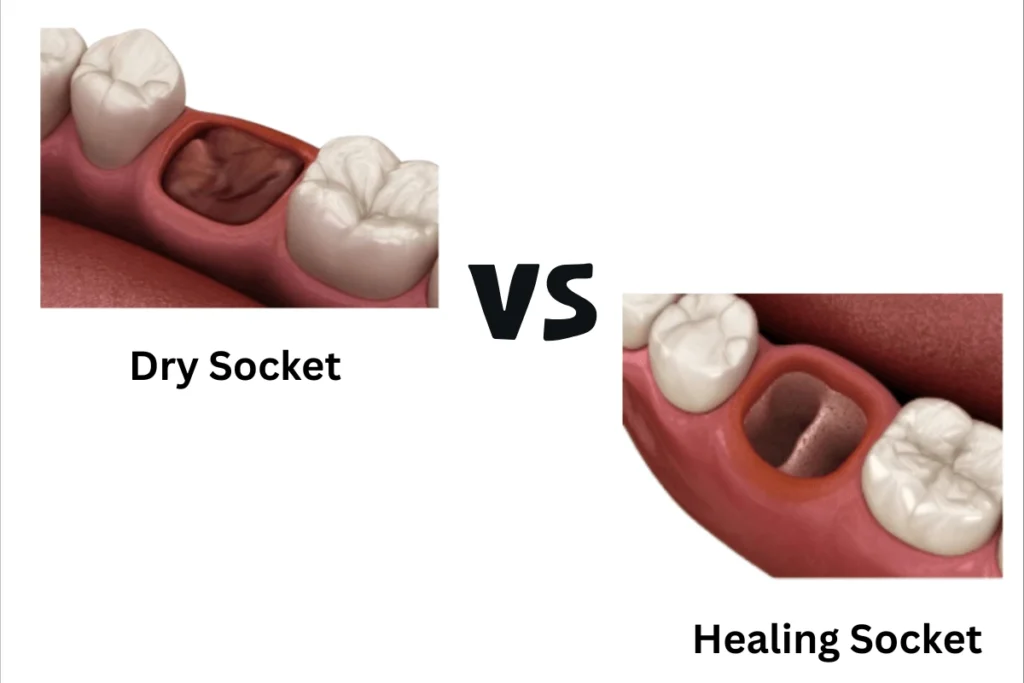
Hot coffee doesn’t just “warm” the clot; it liquefies it. Think about what happens when you pour hot soup on Jell-O. At just 100°F (barely warmer than tap water), that clot starts dissolving.
Lose it, and you’ll get a dry socket: a raw, open wound where every sip of air feels like a dagger. I’ve seen patients describe it as “someone drilling into their jawbone.”
Painkillers? They’ll barely take the edge off.
But heat’s only half the battle. Coffee’s caffeine is a sneaky saboteur. It narrows blood vessels, like squeezing a garden hose, slowing the flow of oxygen and nutrients your wound needs to heal.
Research shows caffeine can delay tissue repair by nearly a third in those critical first days. You’re not just sipping coffee; you’re starving your recovery.
And let’s talk acidity. Coffee’s pH hovers around 5, less harsh than soda but still acidic enough to burn. Imagine rubbing a lime wedge on a fresh scrape.
That sting? It’s your healing tissue getting fried. Acids also invite bacteria to party in the wound, raising infection risks.
Your mouth’s trying to rebuild; coffee’s basically tossing rubble into the construction site.
Bottom line? That innocent-looking mug could cost you weeks of pain. But don’t panic; I’ll show you exactly when and how to reintroduce coffee without wrecking your progress.
When Can You Drink Coffee Again? A Day-by-Day Roadmap
Healing isn’t a race; it’s a careful dance. Here’s exactly what to expect, day by day, and how to reintroduce coffee without regrets:
Days 1–3: Absolutely No Coffee. None.
Let’s get brutal: Days one through three are a zero-coffee zone. Not a drop. Your clot is basically a wet paper towel clinging to the socket.
One wrong move, a hot sip, a caffeine buzz, and you’re gambling with agony.
Here’s why this sucks (literally). That clot is still setting up shop. It’s soft, sticky, and about as stable as a house of cards in a windstorm.
Hot coffee? Even “warm” brews (think: latte served at 100°F) act like a blowtorch on wax. I’ve seen patients lose clots from steam alone.
But heat isn’t your only foe. Caffeine shrinks blood vessels, like stepping on a garden hose, starving the wound of healing nutrients.
A 2022 study tracked extraction patients who drank coffee early: 43% developed unstable clots. Translation? Their sockets healed slower and hurt longer.
What can you drink? Room-temp water. Herbal teas like chamomile (cooled to lukewarm). Sip like you’re nursing a shot of premium whiskey, tiny, slow, no straws.
Sucking creates a vacuum force that’ll rip that clot out faster than a Band-Aid on hairy skin.
And don’t even think about swishing. Let liquids slide down your throat like you’re a passive observer.
Forceful spitting? That’s how clots end up in the sink.
Miss caffeine? Tough love: Deal with it. Nap more. Hydrate like your life depends on it (it does). This isn’t forever, just 72 brutal hours standing between you and disaster.
Days 4–5: Maybe Cold Brew (If You’re Healing Well)
You’ve survived the coffee desert of days 1–3. Now comes the tricky part: Can you cheat safely? Maybe, if your mouth gives the all-clear.
By day 4, swelling should fade. Are gums looking pink, not fire-engine red? No ache when you lightly press near the socket? Maybe it’s cold brew o’clock.
Here’s why cold brew gets a tentative green light. Brewed with cold water over 12+ hours, it’s 67% less acidic than hot coffee.
No heat means no clot meltdown. But this isn’t a free pass; it’s a science experiment.
Step one: Dilute it. Mix equal parts cold brew and water (or oat milk). This cuts acidity again, turning a potential hazard into a mild irritant.
Take one teaspoon-sized sip. Let it glide over your tongue; avoid the extraction side like it’s lava. Swallow fast. Now wait 30 minutes.
Watch for betrayal. A faint warmth in the socket? A sudden throb-throb-throb? That’s your mouth screaming, “Abort mission!” Feel nothing? Take two more sips. Max.
Red flags? Stop. Now. The dry socket doesn’t knock politely; it kicks down the door. A “hollow” sensation, sharp pain radiating to your ear, or a weird salty-metallic taste?
Ditch the coffee. Rinse gently with saltwater. Call your dentist if symptoms stick around.
Cold brew isn’t a victory lap. It’s a test drive. Even if you pass, keep it to 3–4 sips max. Your clot’s still fragile, like a scab that’s just starting to crust over.
One wrong move, and you’re back to square one.
Days 6–7: Lukewarm Coffee (If Your Dentist Gives the Green Light)
By day six, that blood clot’s finally getting a backbone; think of it like a soft cookie that’s started to crisp around the edges. But don’t get cocky.
Your dentist needs to green-light this first. If they say you’re healing clean? You can risk a lukewarm sip.
Here’s the drill: Brew your coffee like usual, then let it sit uncovered for 10–12 minutes. This isn’t about patience; it’s science.
Uncovered cooling drops the temp faster, preventing accidental heat spikes. Aim for below 100°F (test it by dripping a bit on your inner wrist; it should feel neutral, not warm).
Dark roasts are your friend here. Their longer roasting time burns off acidic compounds, making them gentler than bright, fruity, light roasts.
Ditch the sugar. Skip the cinnamon sprinkles. Add a splash of unsweetened oat milk; it coats the coffee’s acidity like a buffer, unlike dairy, which can curdle and irritate the socket.
Sip strategy: Use a small mug. Drink from the side opposite your extraction. Let the coffee flow straight to your throat, no swishing, no lingering on the tongue.
Imagine you’re a covert operative smuggling liquid past the danger zone.
But, and this is a big problem, if your dentist spots redness or slow tissue growth during your checkup, abort the mission.
Lukewarm coffee can still sting like a bee if the socket’s not sealed. And whatever you do, avoid “just a pinch” of sweetener.
Sugar feeds bacteria lurking in the healing crevices, turning a safe sip into an infection risk.
Week 2: Warm Coffee (But Stay Cautious)
By day eight, your sockets were starting to look less like a crime scene. New gum tissue creeps in, thin and pink, like delicate lace over the wound.
But this isn’t “normal” yet; it’s still baby skin. Press gently near the site. Feel a twinge? Put the coffee down. No pain? Maybe you’re cleared for warm sips.
Key word: warm, not hot. Your mouth’s still numb to temperature post-surgery. That “lukewarm” feeling? It’s lying.
Use a kitchen thermometer, aim for under 110°F (43°C). Go over, and you’re slow-cooking tender tissue.
Bean choice matters now. Grab Brazilian or Sumatran beans; their low acid won’t torch the new cells. Light roasts?
Too bright, too acidic. Grind coarser than usual; fine particles can sneak into the socket like gritty invaders.
Sip once a day max. One small cup. Period. Overdo it, and caffeine’s vasoconstriction still starves your healing cells.
After each sip, rinse gently with saltwater (½ tsp salt in 8oz water). Think of it as hosing down a scraped knee; it cleans without scrubbing.
But here’s the kicker: Even now, sugar’s banned. No caramel drizzle. No flavored creamers. Sweetness feeds bacteria hiding in the socket’s nooks, turning your coffee break into an infection risk.
Pro move: Drink your coffee through a wide-open mug, no narrow travel cups. Wide sips reduce liquid contact with the healing side.
And do you taste metal or salt mid-sip? Stop. That’s your body flashing the “check engine” light.
Healing’s a marathon, not a sprint. One week down doesn’t mean immunity. Treat coffee like a cautious reunion with an old friend, not a full-blown celebration.
Week 3–4: Almost Back to Normal
Three weeks post-extraction, that gap in your gums is finally closing shop. The socket’s 80% sealed, so think of it as a rebuilt road with fresh asphalt.
Most folks can sip coffee normally now. But hold the confetti if you had wisdom teeth yanked or bone grafts.
Those complex heals demand 4–6 weeks of patience. The same caution applies after a filling or root canal.
Here’s the good news: Your morning ritual can (mostly) return. Brew hot, drink fast, add cream, within reason. But two landmines remain.
First, travel mugs that need suction. That little sip-lid? It’s a vacuum machine. Pulling liquid through a tiny hole creates pressure that can still tug at delicate tissue. Use an open mug instead.
Second, crushed ice in iced lattes. Those jagged, frozen shards? They’re like glass shards for nerves still waking up post-surgery.
Stick to fridge-chilled coffee or let ice melt completely before sipping.
Pro tip: Test your limits. Start with a half-cup of your usual brew. If there are no zaps or throbbing by noon, bump it to a full cup the next day.
But if you had bone grafts, treat coffee like a fragile truce, even at week four. One rough sip could disturb the graft material, forcing you back to square one.
Best 5 Coffee Alternatives That Actually Help You Heal
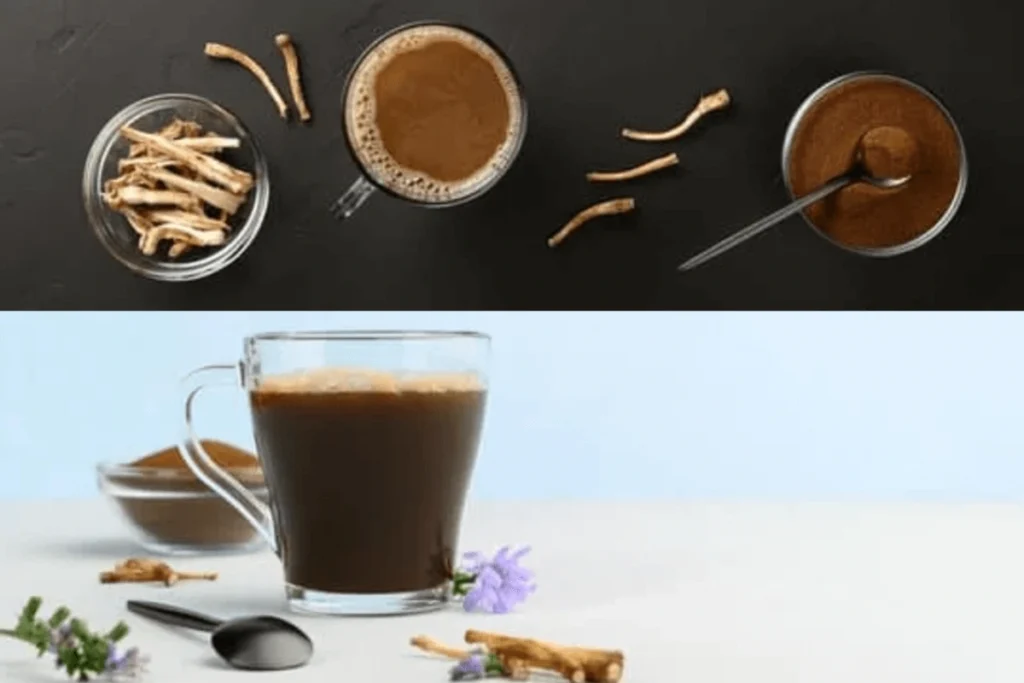
If coffee’s off the table, these drinks soothe cravings and speed up recovery:
Chicory Root “Coffee”
Let’s talk about chicory, the undercover hero of coffee alternatives. Roasted chicory root brews into a drink that’s eerily similar to coffee: deep, earthy, with a hint of caramel.
But here’s the magic: zero caffeine. Zero acid. Zero threats to your healing socket.
History buffs will love this: During the Civil War and WWII coffee shortages, chicory kept soldiers and civilians sane.
It’s not just nostalgia; it’s packed with inulin, a fiber that acts like fertilizer for your gut’s good bacteria.
On antibiotics post-extraction? Chicory helps offset the meds’ gut-wrecking side effects.
To brew, steep 1–2 teaspoons of roasted chicory (find it in health stores or online) in hot water for five minutes. Let it cool to room temp; no rushing.
Add a splash of oat milk for creaminess without dairy’s mucus-forming risks. But, and this is critical, skip chicory if you’re allergic to ragweed, marigolds, or daisies.
Cross-reactivity can trigger sneezing fits or itchy throats, which you don’t want mid-healing.
Golden Milk (Turmeric Latte)
Picture this: A creamy, golden-hued drink that soothes your mouth and cuts inflammation.
Golden milk, a blend of turmeric, ginger, and coconut milk, is like a healing potion for post-extraction misery.
Turmeric’s star compound, curcumin, slashes swelling better than some meds. Coconut milk’s lauric acid? It’s a bacteria-busting ninja, guarding your socket against infections.
Here’s the hack: Simmer a teaspoon of turmeric powder and a pinch of grated ginger in coconut milk for five minutes.
Strain it, let it cool to room temp (no cheating, heat’s still your enemy), and sip slowly. Too lazy to cook?
Grab pre-made golden milk paste from health stores. Mix a spoonful with cold almond milk for an instant anti-inflammatory boost.
Mushroom Coffee
Let’s get weird: mushroom coffee isn’t a dirt-flavored brew. Brands like Four Sigmatic blend real coffee with lion’s mane or chaga mushrooms, creating a drink that’s half the acid and caffeine of your usual cup.
The kicker?
Lion’s mane mushrooms stimulate nerve growth, which is crucial if your extraction leaves nerves tingling or numb.
Think of it as coffee with a side of physical therapy. Chaga mushrooms pile on antioxidants, fighting inflammation without the acidic burn.
But here’s the trick: Brew it weak. Use half the recommended grounds to slash acidity further. Let it cool naturally, with no ice shock, and sip like it’s a delicate tea.
Pro tip: Hate earthy flavors? Add a drop of vanilla extract. It masks the mushroom tang without sugar’s risks.
Just avoid it if you’re allergic to fungi (yes, that’s a real thing). Mushroom coffee won’t fool java purists, but it is for healing. It’s coffee’s smarter, gentler cousin.
Barley Tea (Mugicha)
Ever tried a drink that tastes like toasted cereal and zen? Enter barley tea, mugicha in Japan, and boricha in Korea.
This nutty, caffeine-free brew is the unsung hero of post-extraction recovery. Roasted barley kernels release GABA, a natural chill pill for your nervous system.
Translation? It dials down post-surgery jitters without caffeine’s chaos.
Here’s how to hack it: Steep three tablespoons of roasted barley (find it at Asian markets) in four cups of hot water for 10 minutes.
Strain, cool to room temp, and sip like you’re meditating. The antioxidants? They’re like tiny construction crews patching your gum tissue faster.
Pro tip: Cold-brew it overnight. Throw the barley in a pitcher of water, fridge it for 8 hours, and strain. Less bitter, more refreshing, and perfect for swollen mouths.
Warning: Skip if you’re gluten-sensitive. Barley’s got gluten traces that could irritate your gut. But for most? It’s a healing hug in a mug.
Not coffee, but close enough when your mouth’s on lockdown.
Decaf Green Tea
Decaf green tea is like a spy; it sneaks in healing benefits without the drama of caffeine. Even with most caffeine removed, it keeps 70% of its antioxidants, including EGCG.
This powerhouse compound slashes gum inflammation like a ninja, quieting post-surgery swelling.
Brew it weak: One bag per 12 ounces of water (double the water you’d normally use). Steep for just two minutes; overstepping brings bitterness and excess tannins that can dry your mouth.
Dilute it with cool water until it’s pale gold, like weak sunlight.
After day five, when your clot’s armor is solid, add a drizzle of raw honey. Honey’s not just sweet; it’s antibacterial, coating the socket like a protective glaze.
Skip lemon or sugar; acidity and sweetness are still enemies in disguise.
How to Drink Coffee Safely: A Barista’s Survival Guide

Let’s say you’re desperate. You need coffee before your dentist’s timeline. Fine, but here’s how to cheat the system (mostly).
Cool, it’s like you’re defusing a bomb. Brew your coffee, then leave it uncovered for 10–12 minutes. Stir nonstop; spoons accelerate cooling.
Test a drop on your wrist. If it feels like nothing, you’re golden. Want iced coffee? Chill it in the fridge overnight.
Crushed ice is a hard no; it’s like tossing rocks into a healing wound.
Bean’s choice is life or death. Grab dark roast Brazilian or Sumatran beans. Their low acid won’t torch tender tissue.
Avoid citrusy African beans or flavored coffees; they’re acid traps. Grind coarser than usual; fine grounds can invade the socket like gritty spies.
Sip like a smuggler. Use a wide-rimmed mug. Tilt your head so coffee flows to the opposite side of your mouth.
Take teaspoon-sized sips. Swallow fast, not letting it pool under your tongue. Imagine you’re passing contraband past a security checkpoint.
Hack your additives. A splash of unsweetened oat milk cuts acidity without dairy’s risks. A tiny pinch of baking soda (think grains of salt) neutralizes acid invisibly.
After day seven, a cinnamon sprinkle fights germs but skips sugar, syrups, and creamers. They’re bacteria buffets.
Rinse like you’re defusing evidence. Within five minutes of drinking, mix ½ tsp salt in 8oz lukewarm water.
Take a sip, tilt your head gently, and let it waterfall out. No swishing; that’s how coffee remnants get caught in the socket’s nooks.
Start slower than a sloth. Days 4–5: Two sips of cold brew. Days 6–7: Quarter-cup of lukewarm. Week two: One small cup every other day.
Track every twinge in a notebook. Sudden pain? Abort. Call your dentist.
This isn’t a free pass; it’s a loophole. You’re still gambling, but these tricks tilt the odds. Miss your morning ritual?
I get it. But remember: Healing first, habit second.
I Drank Coffee Too Soon, Help!
So you caved. You sipped coffee on day two.
Now panic’s setting in. Breathe. Most early slip-ups don’t doom you, but how you react following matters.
First: Stop stressing. Anxiety spikes blood pressure, turning oozing into a faucet. Freaking out is like throwing gasoline on a fire.
Sit down. Tilt your head slightly forward (prevents blood pooling).
Next: Rinse smarter. Mix ½ tsp salt in 8oz lukewarm water, not hot, not cold. Take a mouthful and tilt your head sideways (like you’re checking your ear for rain).
Let the liquid trickle out. No swishing. No spitting. Pretend you’re a statue with a leaky mouth.
Now: Play detective. Smell your breath. Foul odor? That’s bacteria throwing a post-coffee rager. Check the mirror.
See a white-greyish socket? Good. Spot a dark hole with visible bone? Bad. Really bad.
Danger signs scream “dry socket”:
- Pain that starts mild then explodes up your jaw to your ear.
- A weird “empty” feeling in the socket, like wind whistling through a cave.
- Feverish chills or a salty-metallic taste that won’t quit.
If any hit, call your dentist now. Not tomorrow. Not after work. The dry socket won’t self-fix; it needs professional patching.
But if you feel…fine? Don’t relax. Monitor for 48 hours. Eat soft foods. Skip straws. And no more coffee until day five.
You dodged a bullet; don’t reload the gun.
Remember: One mistake isn’t a death sentence. But push luck twice, and “Can I drink coffee after tooth extraction?” becomes “Why won’t my mouth stop hurting?”
Myths vs. Facts
Let’s bust some dangerous myths floating around.
Myth: “Iced coffee is safe right after surgery; it’s cold!”
Fact: Iced coffee is still loaded with caffeine and acid. Temperature doesn’t magically erase those threats. Think of it like poisoned ice cream, still toxic, just colder. Wait 72 hours minimum.
Myth: “Decaf is harmless, it’s basically water!”
Fact: Decaf coffee is a wolf in sheep’s clothing. It has 2–15mg caffeine per cup (not zero) and the same acidity as regular brew. Your clot doesn’t care about labels; it just hates acid. A three-day wait applies here, too.
Myth: “A teaspoon of sugar won’t hurt. It’s just a little!”
Fact: Sugar in coffee is like leaving candy out for ants. Bacteria in your socket feast on it, multiplying faster than a TikTok trend. Even half a teaspoon risks infection. Sweeten after week two, or never.
Heard other “advice”? Assume it’s wrong until proven right. Your healing mouth isn’t a myth-testing ground.
Can I drink coffee after tooth extraction?
Yes, but not yet. Your mouth gets one chance to heal right. Mess it up, and you’re signing up for weeks of pain. Here’s the cheat code:
- Cold brew: Day 5–7 if your socket looks calm.
- Hot coffee: Day 10–14 if your dentist gives thumbs-up.
This isn’t about willpower; it’s strategy. Rush it, and you’ll trade three days of cravings for three weeks of agony. Wait it out, and that first legal sip? It’ll taste like victory.
When you’re cleared, go premium. Choose low-acid beans. Savor the aroma. Toast to your patience. Healing isn’t just about your mouth; it’s about respecting the process.
Your coffee isn’t going anywhere. But your chance to heal? That’s now. Choose wisely.
Conclusion
Healing beats caffeine every time. Wait, those critical days. Protect your clot. Then, sip smart.
Your patience pays off. That first post-extraction coffee? Make it legendary. Choose beans wisely. Savor slow.
Share this guide. Bookmark it. Your future self, pain-free and sipping happily, will thank you.
Recovery first. Coffee second. Always.
Cheers to your soon-to-be-safe sip.
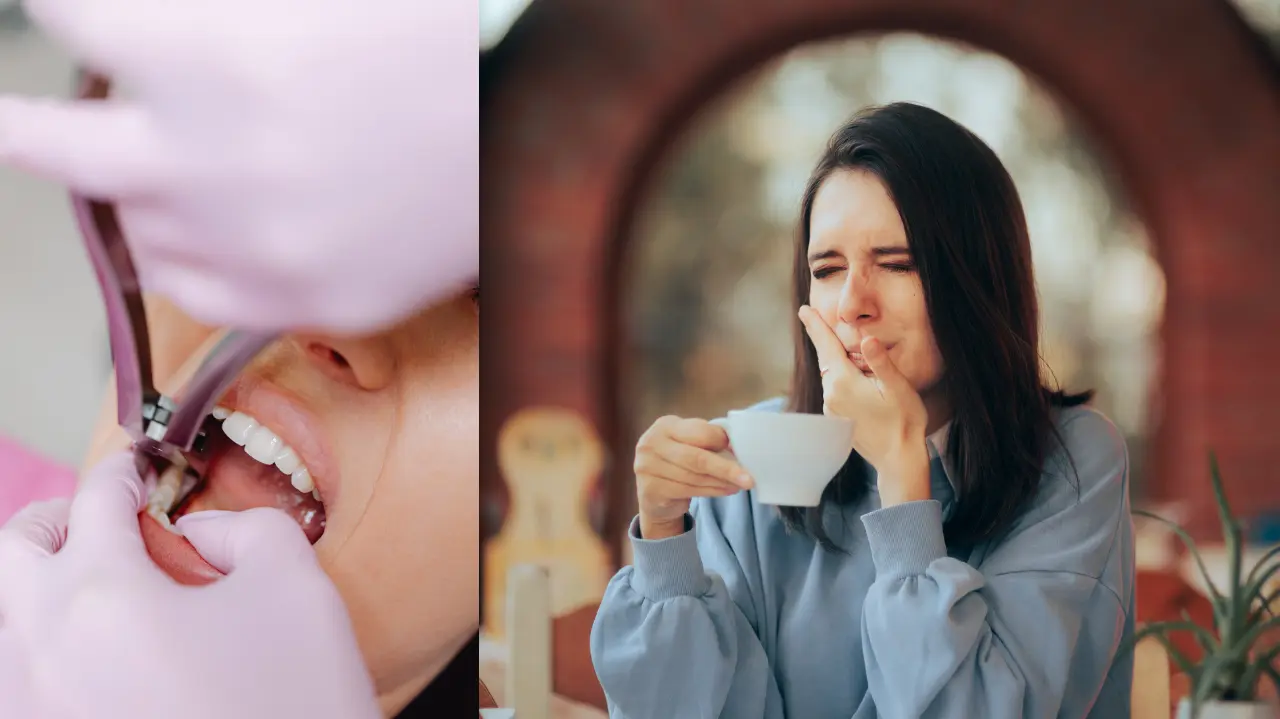

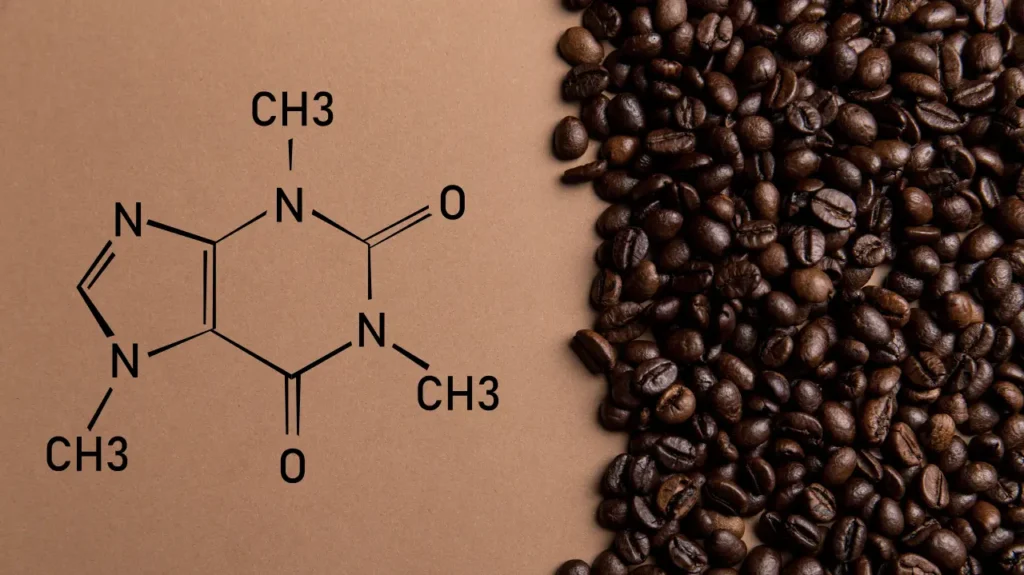
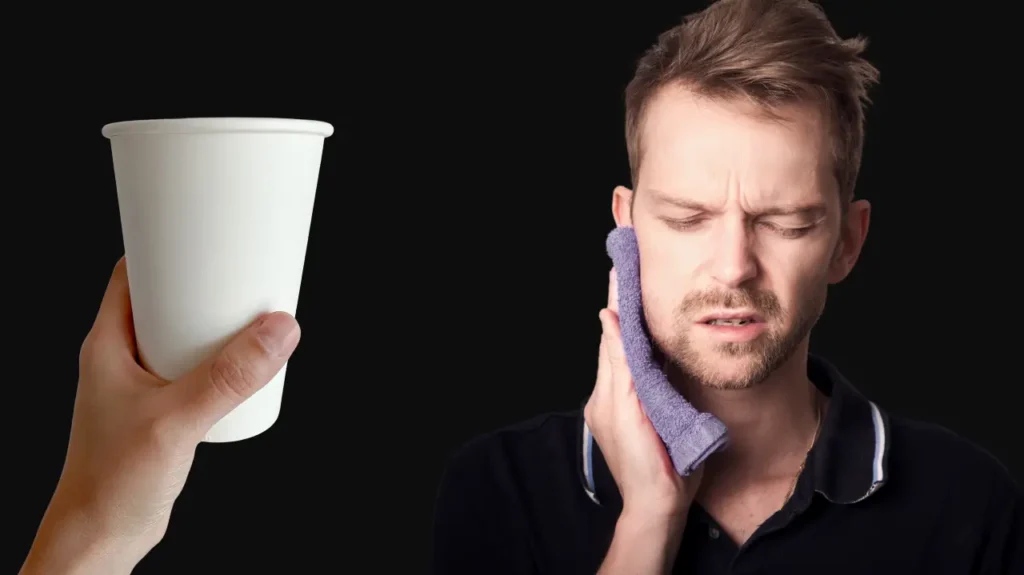
![How Long After Fluoride Treatment Can I Drink Coffee? [Dentist-Approved Guide] how long after fluoride treatment can i drink coffee](https://coffeelake.org/wp-content/uploads/2025/05/how-long-after-fluoride-treatment-can-i-drink-coffee-1024x575.webp)